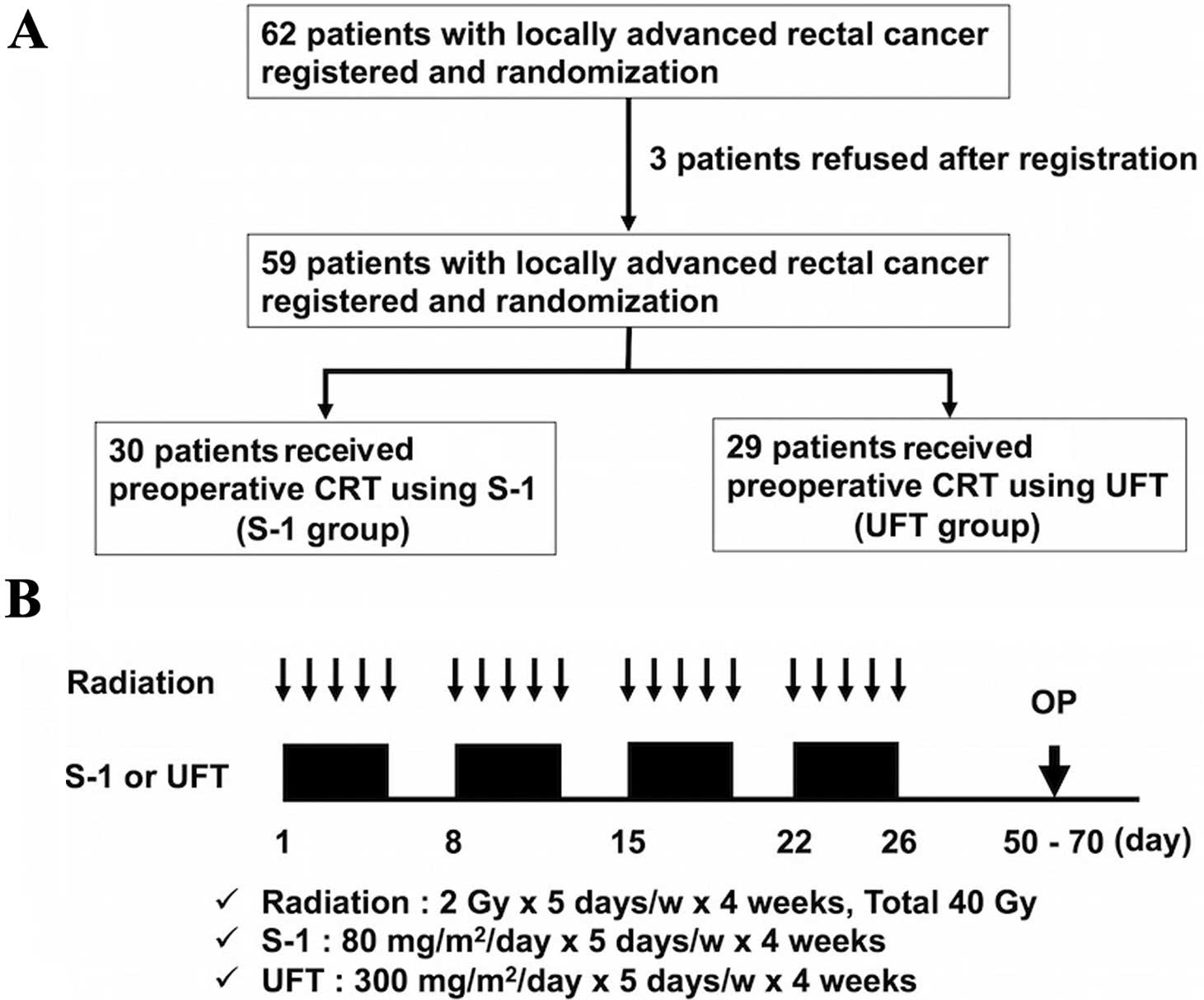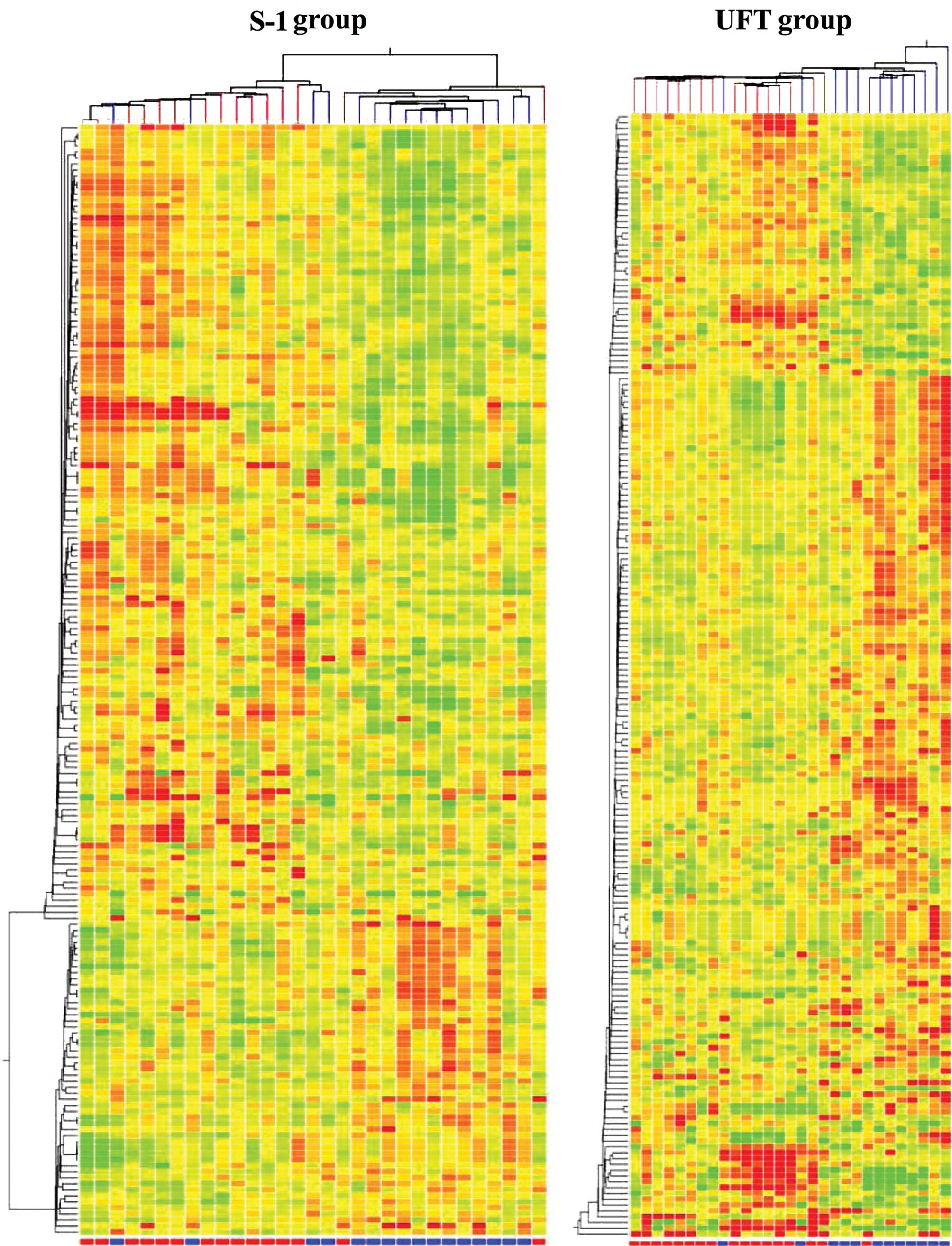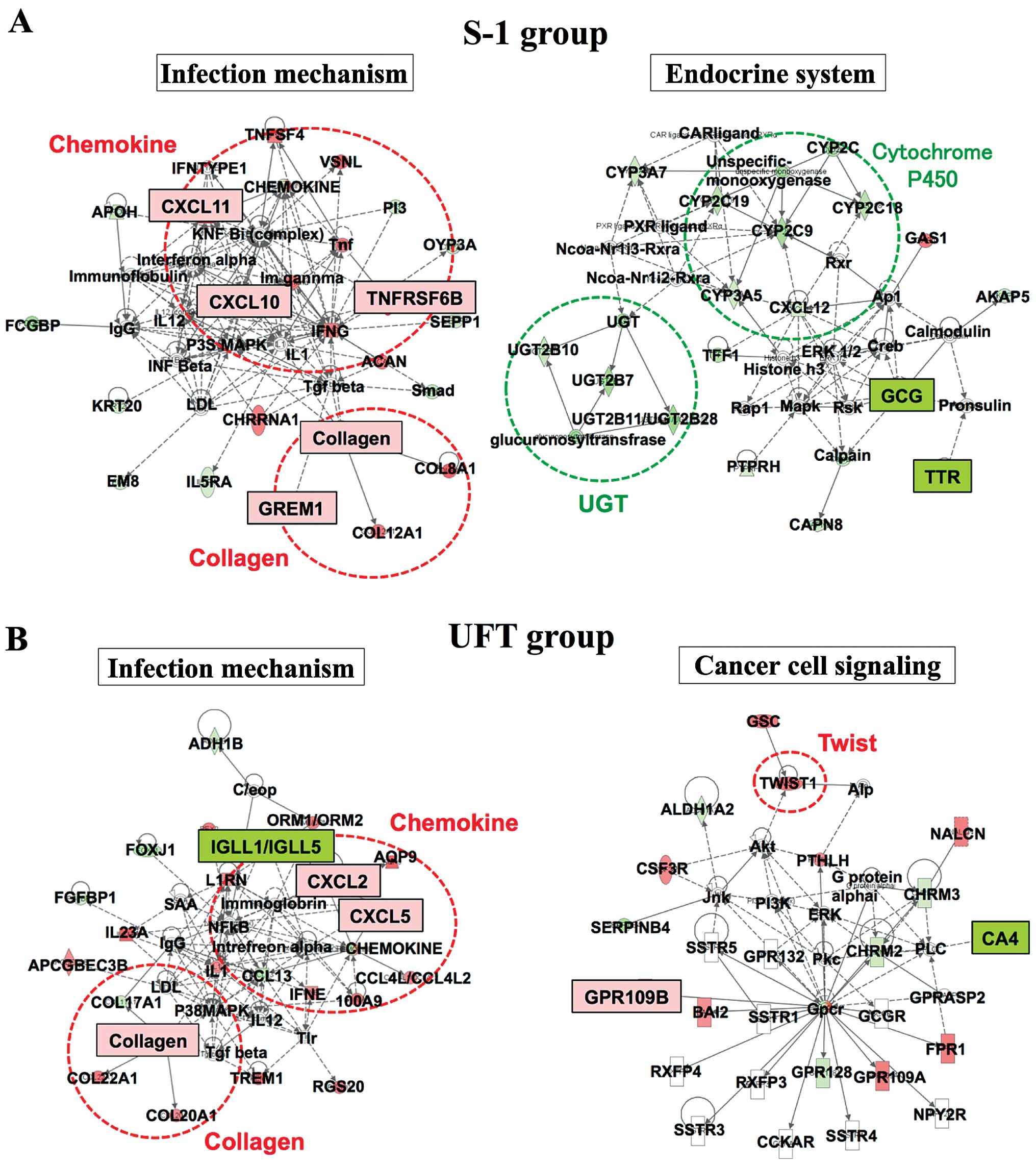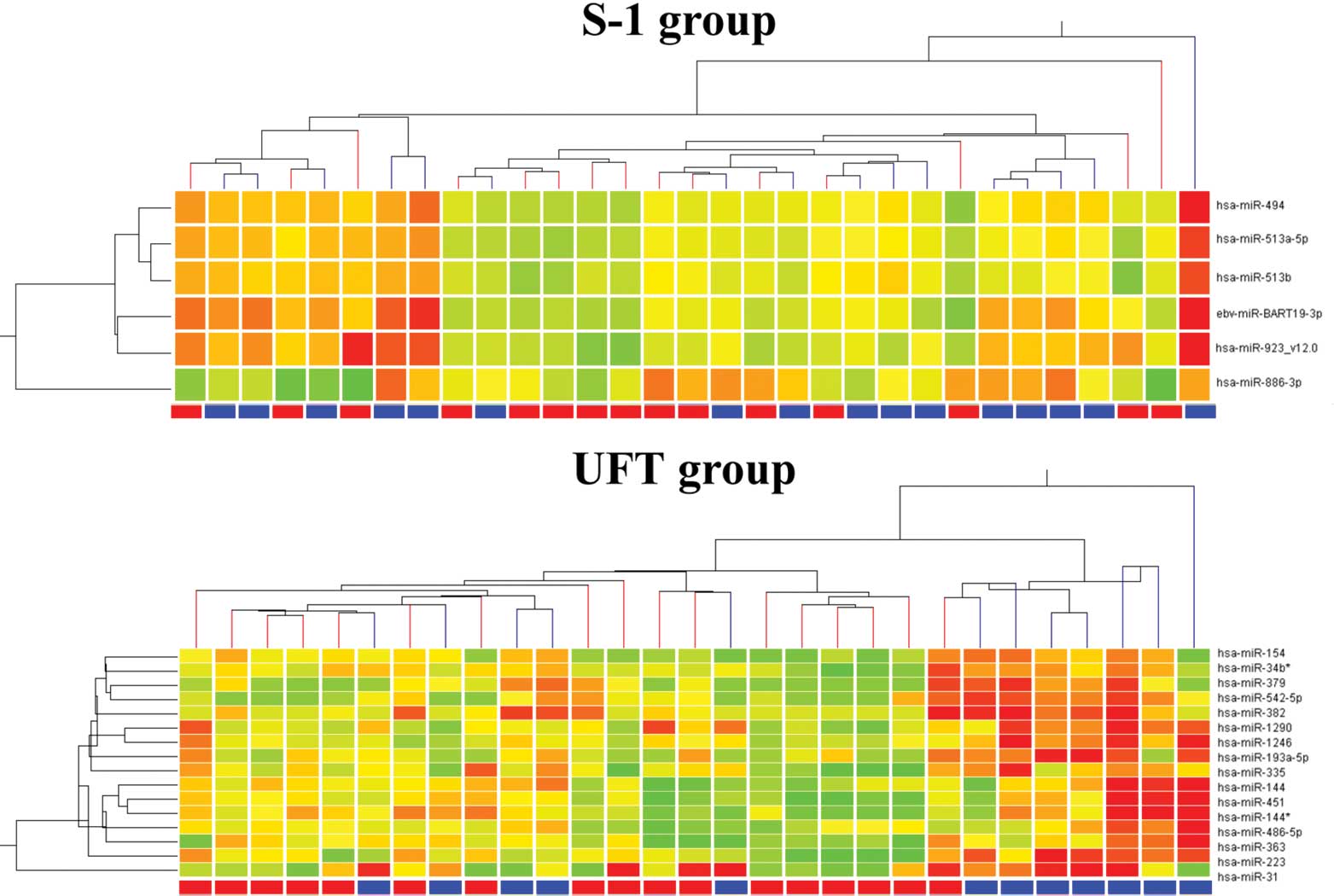|
1
|
Sauer R: Adjuvant and neoadjuvant
radiotherapy and concurrent radiochemotherapy for rectal cancer.
Pathol Oncol Res. 8:7–17. 2002. View Article : Google Scholar : PubMed/NCBI
|
|
2
|
Gérard JP, Conroy T, Bonnetain F, Bouché
O, Chapet O, Closon-Dejardin MT, Untereiner M, Leduc B, Francois E,
Maurel J, et al: Preoperative radiotherapy with or without
concurrent fluorouracil and leucovorin in T3-4 rectal cancers:
Results of FFCD 9203. J Clin Oncol. 24:4620–4625. 2006. View Article : Google Scholar : PubMed/NCBI
|
|
3
|
Bosset JF, Collette L, Calais G, Mineur L,
Maingon P, Radosevic-Jelic L, Daban A, Bardet E, Beny A and Ollier
JC; EORTC Radiotherapy group Trial 22921: Chemotherapy with
preoperative radiotherapy in rectal cancer. N Engl J Med.
355:1114–1123. 2006. View Article : Google Scholar : PubMed/NCBI
|
|
4
|
Morimoto S, Shimada M, Kurita N, Sato H,
Iwata T, Nishioka M, Yoshikawa K, Miyatani T, Kashihara H, Takasu
C, et al: Preoperative radiotherapy combined with S-1 for advanced
lower rectal cancer: Phase I trial. Hepatogastroenterology.
59:1428–1432. 2012.
|
|
5
|
Hotchi M, Okitsu H, Miura M, et al: A
phase II trial of preoperative chemoradiotherapy with oral
DPD-inhibitory fluoropyrimimidines in patients with advanced rectal
cancer. J Cancer Ther. 3:989–995. 2012. View Article : Google Scholar
|
|
6
|
Ghadimi BM, Grade M, Difilippantonio MJ,
Varma S, Simon R, Montagna C, Füzesi L, Langer C, Becker H, Liersch
T, et al: Effectiveness of gene expression profiling for response
prediction of rectal adenocarcinomas to preoperative
chemoradiotherapy. J Clin Oncol. 23:1826–1838. 2005. View Article : Google Scholar : PubMed/NCBI
|
|
7
|
Kim IJ, Lim SB, Kang HC, Chang HJ, Ahn SA,
Park HW, Jang SG, Park JH, Kim DY, Jung KH, et al: Microarray gene
expression profiling for predicting complete response to
preoperative chemoradiotherapy in patients with advanced rectal
cancer. Dis Colon Rectum. 50:1342–1353. 2007. View Article : Google Scholar : PubMed/NCBI
|
|
8
|
Rimkus C, Friederichs J, Boulesteix AL,
Theisen J, Mages J, Becker K, Nekarda H, Rosenberg R, Janssen KP
and Siewert JR: Microarray-based prediction of tumor response to
neoadjuvant radiochemotherapy of patients with locally advanced
rectal cancer. Clin Gastroenterol Hepatol. 6:53–61. 2008.
View Article : Google Scholar : PubMed/NCBI
|
|
9
|
Watanabe T, Kobunai T, Akiyoshi T, Matsuda
K, Ishihara S and Nozawa K: Prediction of response to preoperative
chemoradiotherapy in rectal cancer by using reverse transcriptase
polymerase chain reaction analysis of four genes. Dis Colon Rectum.
57:23–31. 2014. View Article : Google Scholar
|
|
10
|
Pazdur R, Hoff PM, Medgyesy D, Royce M and
Brito R: The oral fluorouracil prodrugs. Oncology. 12(Suppl 7):
S48–S51. 1998.
|
|
11
|
Giralt J, Tabernero J, Navalpotro B,
Capdevila J, Espin E, Casado E, Mañes A, Landolfi S, Sanchez-Garcia
JL, de Torres I, et al: Pre-operative chemoradiotherapy with UFT
and Leucovorin in patients with advanced rectal cancer: A phase II
study. Radiother Oncol. 89:263–269. 2008. View Article : Google Scholar : PubMed/NCBI
|
|
12
|
Van Cutsem E, Hoff PM, Harper P, Bukowski
RM, Cunningham D, Dufour P, Graeven U, Lokich J, Madajewicz S,
Maroun JA, et al: Oral capecitabine vs intravenous 5-fluorouracil
and leucovorin: Integrated efficacy data and novel analyses from
two large, randomised, phase III trials. Br J Cancer. 90:1190–1197.
2004. View Article : Google Scholar : PubMed/NCBI
|
|
13
|
Lee EM, Hong YS, Kim KP, Lee JL, Kim SY,
Park YS, Choi DH, Kim JH, Lim SB, Yu CS, et al: Phase II study of
preoperative chemoradiation with S-1 plus oxaliplatin in patients
with locally advanced rectal cancer. Cancer Sci. 104:111–115. 2013.
View Article : Google Scholar
|
|
14
|
Saigusa S, Toiyama Y, Tanaka K, Yokoe T,
Okugawa Y, Kawamoto A, Yasuda H, Inoue Y, Miki C and Kusunoki M:
Stromal CXCR4 and CXCL12 expression is associated with distant
recurrence and poor prognosis in rectal cancer after
chemoradiotherapy. Ann Surg Oncol. 17:2051–2058. 2010. View Article : Google Scholar : PubMed/NCBI
|
|
15
|
Zhang J, Luo X, Li H, Yue X, Deng L, Cui Y
and Lu Y: MicroRNA-223 functions as an oncogene in human colorectal
cancer cells. Oncol Rep. 32:115–120. 2014.PubMed/NCBI
|
|
16
|
Li X, Zhang Y, Zhang H, Liu X, Gong T, Li
M, Sun L, Ji G, Shi Y, Han Z, et al: miRNA-223 promotes gastric
cancer invasion and metastasis by targeting tumor suppressor
EPB41L3. Mol Cancer Res. 9:824–833. 2011. View Article : Google Scholar : PubMed/NCBI
|
|
17
|
Kurashige J, Watanabe M, Iwatsuki M,
Kinoshita K, Saito S, Hiyoshi Y, Kamohara H, Baba Y, Mimori K and
Baba H: Overexpression of microRNA-223 regulates the ubiquitin
ligase FBXW7 in oesophageal squamous cell carcinoma. Br J Cancer.
106:182–188. 2012. View Article : Google Scholar :
|
|
18
|
Pinatel EM, Orso F, Penna E, Cimino D,
Elia AR, Circosta P, Dentelli P, Brizzi MF, Provero P and Taverna
D: miR-223 is a coordinator of breast cancer progression as
revealed by bioinformatics predictions. PLoS One. 9:e848592014.
View Article : Google Scholar : PubMed/NCBI
|
|
19
|
Liang L, Zhu J, Zaorsky NG, Deng Y, Wu X,
Liu Y, Liu F, Cai G, Gu W, Shen L, et al: MicroRNA-223 enhances
radiation sensitivity of U87MG cells in vitro and in vivo by
targeting ataxia telangiectasia mutated. Int J Radiat Oncol Biol
Phys. 88:955–960. 2014. View Article : Google Scholar : PubMed/NCBI
|
|
20
|
Hotchi M, Shimada M, Kurita N, Iwata T,
Sato H, Morimoto S, Yoshikawa K, Higashijima J and Miyatani T:
microRNA expression is able to predict response to
chemoradiotherapy in rectal cancer. Mol Clin Oncol. 1:137–142.
2013.PubMed/NCBI
|


















